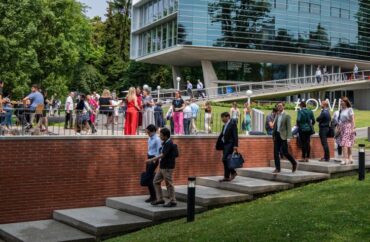The Annual Social Entrepreneurship Conference celebrated its 20th anniversary on 18 – 20 April at IMD in Lausanne with paper sessions, panels, and keynote speeches focused on the most exciting and emerging research in social entrepreneurship, social enterprise, innovation, sustainability, and impact.
Sponsored by IMD and the Marshall School of Business, University of Southern California, more than 150 scholars and practitioners came from 23 countries to listen to 84 presentations spanning topics including social venture legitimacy, the impact of political systems on the work of social entrepreneurs, and emerging themes in social entrepreneurship education.
A key theme of this year’s conference – held for the first time at IMD – was the value of collaboration across disciplines, sectors, and stakeholders, to deliver even greater social impact.
“Many social entrepreneurs challenge and inspire,” said David Bach, Professor of Strategy and Political Economy, Rio Tinto Chair in Stakeholder Engagement, and Dean of Innovation and Programs at IMD, in his welcoming remarks.
“They contribute so much to society by challenging us, challenging our assumptions, challenging the way things have been done in the past and inspiring through their own creativity, purpose and innovation, new ways of doing.”
Reflecting on 20 years of the conference, Co-Director Sophie Bacq, Professor of Social Entrepreneurship and Coca-Cola Foundation Chair in Sustainable Development, said she saw social entrepreneurship at “a point of convergence” with other disciplines. Referencing the work of German textile artist Anni Albers, which inspired the design of this year’s conference brochure, Bacq said there were two important lessons for social entrepreneurship.
“One is the importance human connection,” she said. “There’s a lot of potential and power that is conveyed to use when we work with social entrepreneurs. The second thing is that the canvas reminds us of interconnection, as humans in general, but also as scholars.”
Ownership, competencies, and advocacy
In her opening keynote, Rachida Justo from IE University, explored the “overlooked” topic of ownership in social entrepreneurship in particular “what, when, and how to own” and how ownership influences the legacy and legitimacy of social enterprises.
“There is an interesting paradox in ownership,” said Justo. “On the one hand, power, ownership, and wealth confer on us the responsibility and the privilege of being able to address problems that are generated by a recurrent system. But at the same time, the more powerful you are, the more important your wealth or your power, the higher the legitimacy issues you might face when engaging in impact.”
Kai Hockerts from Copenhagen Business School emphasized the “changemaking” role social entrepreneurs can play by identifying opportunities that can lead to transformation across sectors and industries. Addressing the competencies needed by social entrepreneurs, Hockerts presented research categorizing them into three buckets: impact, entrepreneurship, and engagement.
In the third keynote, Johanna Mair, from the Hertie School, posited that socio-cultural advocacy, shaping opinions and changing norms and behaviors, as well as political advocacy work directed at policy and regulatory change are part of the work done by social enterprises.
“Advocacy is essential to influence social and political systems,” said Mair. “We would like to start a conversation that recognizes, acknowledges, makes sense, and supports the public and the political life of social enterprises.”
The evolution of social entrepreneurship
In a closing panel at the 20th Annual Social Entrepreneurship Conference at IMD in Lausanne, five esteemed scholars discussed the evolution of the field over the past two decades and noted how social entrepreneurship has gained maturity and legitimacy over the past two decades.
Asked by the conference’s Co-Director Jill Kickul, Research Director, Brittingham Social Enterprise Lab, and Professor, at the Lloyd Greif Center for Entrepreneurial Studies, USC Marshall School of Business, to reflect on what scholars can do to further advance the impact of the research, panelists identified several new fields of study.
Lisa Hehenberger from ESADE highlighted the need to integrate impact metrics into accounting, suggesting that we measure corporate profit by considering the externalities of value creation and destruction. “If we start including data around impact in our accounting systems that’s when these topics are going to be taken seriously, not just by certain enterprises but also by corporates,” she said.
Filipe Santos from CATÓLICA-LISBON suggested the work of social entrepreneurs can be “catalysts for change” inside larger corporations, and encouraged scholars to consider how to embed social political behavior inside large corporations.
Anne-Claire Pache from ESSEC advocated for developing “H-shaped” leaders – hybrid leaders, who possess skills at the intersection of social/environmental issues, business, and the public sector.
Since the pandemic there has been greater emphasis on the importance of community-based assets, said Helen Haugh from the University of Cambridge and raised the idea of looking at how communities can own assets and develop sustainable business models.
Tyler Wry from the Wharton School reminded the audience of academia’s role to be critical of the status quo and not just assume that anything marked ESG or social enterprise is inherently good. He also urged scholars to keep thinking about what the big questions are that can make a difference in the world. “That really has to be the North Star of where we take the research,” he said.
There was also a recognition of the strength of the conference of building and empowering a community of like-minded scholars. As Filipe Santos from CATÓLICA-LISBON said: “In some ways social entrepreneurship researchers are like social entrepreneurs: they are really nice, positive people who want to change the world for the better and are working very hard. So to be part of this community, it’s amazing.”

